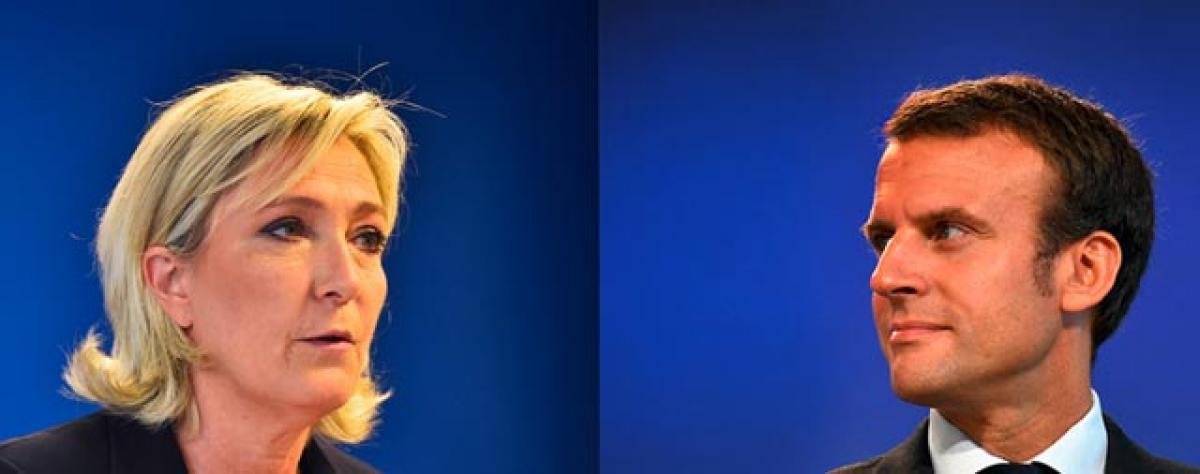Live
- Bad air: 106 shuttle buses, 60 extra Metro trips planned to make Delhiites give up cars
- WHO reports declining monkeypox cases in Congo
- CM Attends Kotideepotsavam on Kartika Purnima
- PKL Season 11: Raiding trio of Devank, Ayan, Sandeep help Patna Pirates rout Bengal Warriorz
- Food waste crisis fuels sustainable practices across APAC food & beverage industry: Report
- AI helps erase racist deed restrictions in California
- ATMIS completes third phase of troops' drawdown in Somalia
- PM Kisan Samman Nidhi scheme bringing smile to Nalanda farmers
- German economy forecast to lag eurozone growth until 2026
- CM Shinde orders stern action against hoarding of onions amid rising prices
Just In

The populist tsunami that slammed into Britain last year, before sweeping across the Atlantic to the United States, may have faded on the shores of France on Sunday.
Paris : The populist tsunami that slammed into Britain last year, before sweeping across the Atlantic to the United States, may have faded on the shores of France on Sunday.
Despite a strong performance from far-right leader Marine Le Pen in the first round of France's presidential election, the bigger news was the success of Emmanuel Macron, an independent centrist who rode to victory with a counter-intuitive campaign that embraced globalisation, immigration and the European Union.
The polls suggest Macron will beat Le Pen soundly in the second round runoff on May 7. If he does, it could open the door to more ambitious reforms of the French economy and an elusive compromise with Germany on overhauling the troubled euro zone. Just 39 years old and with only four years of political experience under his belt, Macron represents a generational change and a break from the left-right divide that has defined French politics for over half a century.
He would face formidable challenges as president. Nearly half of French voters opted for candidates on the extreme right and left of the political spectrum. These people are unlikely to embrace Macron's liberal democratic vision, leaving France a deeply divided nation.
A president Macron could also struggle to cobble together a centrist majority in parliament after legislative elections in June. But after Brexit and the election of US President Donald Trump, his first round victory -- which comes after setbacks to far-right politicians in Austria, the Netherlands and Germany in recent months -- shows that the political centre is holding in the heart of Europe.
"It looks as though populism is in retreat in Europe," said Iain Begg of the London School of Economics. Macron was the only candidate among the four frontrunners who embraced the idea of closer European integration during the campaign.
Le Pen and hard-left politician Jean-Luc Melenchon were openly hostile, floating the idea of a French exit from the EU. And conservative Francois Fillon, in the Gaullist tradition, spoke mainly about boosting France's influence in Europe. At the post-election party at Porte de Versailles in the south of Paris, Macron supporters waved both French and EU flags. His victory was hailed from Brussels to Berlin on Sunday evening.
"Great for Europe" said German Foreign Minister Sigmar Gabriel, who worked with Macron on ideas for reforming the European Union when both were economy ministers. Central to Macron's approach to Europe is his belief that France must reform its own economy in order to restore a level of trust with Germany. He wants to pursue a comprehensive deal with Berlin that includes reform of the euro zone and closer cooperation on defence and migration.
Macron travelled to Berlin twice this year, meeting with Chancellor Angela Merkel in March. His European advisers have said that if he wins the presidency, he will not wait until German elections in September to begin discussing a roadmap for European reform with the German government.
"We will go to them with a list of options," Sylvie Goulard, a member of the European parliament and adviser to Macron who is seen as a possible foreign minister, told Reuters last month. "Now is the time to ask ourselves what is the right architecture."
Macron is in favour of transforming Europe's bailout fund, the ESM, into a full-blown European Monetary Fund, an idea that has supporters in Berlin. He is also in favour of a euro zone budget and finance minister, ideas that are less popular in Merkel's entourage.
Europe's economy is recovering after years of sluggish growth, but years of financial turmoil have exposed flaws in the bloc's architecture that experts believe have left it vulnerable to future shocks.
Many express concern about how highly-indebted countries like Italy will cope when the European Central Bank begins pushing up interest rates and unwinding the bond-buying scheme that has kept borrowing costs artificially low.
"If Macron is elected there is an historic opportunity which may not come around again," said Jeromin Zettelmeyer, senior fellow at the Peterson Institute for International Economics and former top official in the German economy ministry.
"It will be very difficult for Germany not to engage with Macron on serious euro zone reform if he goes about this in the right way, reforming at home first and reassuring the Germans that Europe will not turn into a transfer union."
Others are sceptical about whether Macron can convince the Germans to do a deal. Christian Odendahl of the Centre for European Reform points to a lack of "intellectual convergence" between Berlin and Paris on what Europe really needs. "In Berlin, there isn't a great sense of urgency.
They see this as a marathon, not a sprint. There is a preference for incremental improvements in Europe rather than bold new projects," he said. Meanwhile, Marine Le Pen vowed on Sunday to defend France against "rampant globalisation" after she qualified to fight out the second round of the country's presidential election against centrist Emmanuel Macron.
By Noah Barkin

© 2024 Hyderabad Media House Limited/The Hans India. All rights reserved. Powered by hocalwire.com







